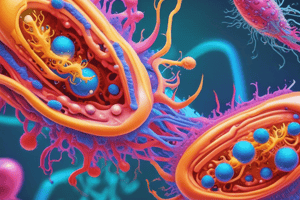Podcast
Questions and Answers
Why were protozoans historically regarded as 'one-celled animals'?
Why were protozoans historically regarded as 'one-celled animals'?
- Due to their multicellular structure
- Because of their plant-like characteristics
- Due to their animal-like behaviors and lack of cell wall (correct)
- Based on their parasitic nature
What is the meaning of the word 'protozoa'?
What is the meaning of the word 'protozoa'?
- First animals (correct)
- Microscopic organisms
- Single-celled plants
- Parasitic eukaryotes
Why did the classification of protozoa as a class within the Animalia become no longer justifiable?
Why did the classification of protozoa as a class within the Animalia become no longer justifiable?
- It was reclassified as a type of fungi
- It was found to be closely related to plants
- It was discovered to have a cell wall
- It failed to meet the standards of being monophyletic and holophyletic (correct)
What is a key characteristic of protozoa?
What is a key characteristic of protozoa?
How are protozoa classified in a loose way?
How are protozoa classified in a loose way?
Flashcards are hidden until you start studying
Study Notes
Protozoa: Historical Context and Characteristics
- Protozoans were historically regarded as 'one-celled animals' because they were thought to be single-celled organisms that possess animal-like characteristics.
- The word 'protozoa' is derived from the Greek words 'protos' meaning 'first' and 'zoon' meaning 'animal', indicating that they were considered to be the most primitive or earliest forms of animal life.
- The classification of protozoa as a class within the Animalia became no longer justifiable because they were found to be a diverse group of organisms that exhibit both plant-like and animal-like characteristics, making it difficult to categorize them as solely animals.
- A key characteristic of protozoa is that they are eukaryotic, meaning their cells have a true nucleus, and are typically microscopic in size.
- Protozoa are classified in a loose way, often being grouped into several categories, including flagellates, amoebas, ciliates, and sporozoa, based on their morphology, movement, and mode of nutrition.
Studying That Suits You
Use AI to generate personalized quizzes and flashcards to suit your learning preferences.




